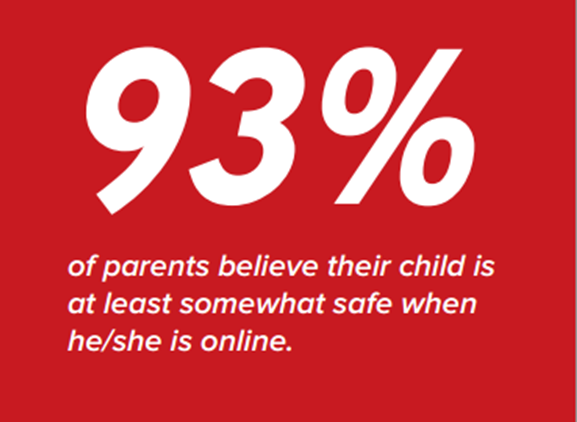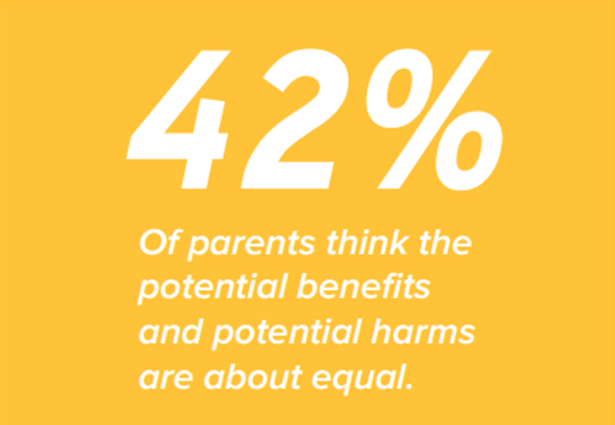Last fall, FOSI talked to parents around the country to find out more about what it means to be a parent in the digital age. Through Hart Research Associates, we conducted a nationwide survey and a series of diverse focus groups in Towson, Maryland to learn more about how parents weigh the potential benefits and harms of their kids using technology and going online.
FOSI explored what areas of online life concerned parents and how confident parents felt about their ability to manage their kids’ use of technology. FOSI released the final report, “Parenting in the Digital Age: How Parents Weigh the Potential Benefits and Harms of Their Children’s Technology Use” in November 2014.
Some of the key findings include:
- When weighing the potential benefits and potential harms of their children using electronic devices and being online, the majority of parents (53%) feel that overall, the potential benefits outweigh the potential harms.
- FOSI found that most parents (64%) are confident in their ability to keep track of their child’s technology use, but those with younger children (73%) express greater confidence than parents of teens (58%.)
- Most parents say (95%) they monitor their child’s technology use at least somewhat closely. Parents of teens (41%) are notably less likely than parents of younger children age 6 to 9 (68%) to say they monitor technology usage very closely.
- 93% of parents believe their child is at least somewhat safe when he/she is online, though just 37% say their child is very safe.
 During the research focus groups, parents shared how they use technology at home and some of the benefits and problems they experience. We heard from a lot of parents who were worried about technology having a negative impact on their kids’ interpersonal communication skills, but we also heard stories from some parents whose kids are shy or have developmental issues and are really aided by the ability to communicate by text, email, and social media.
During the research focus groups, parents shared how they use technology at home and some of the benefits and problems they experience. We heard from a lot of parents who were worried about technology having a negative impact on their kids’ interpersonal communication skills, but we also heard stories from some parents whose kids are shy or have developmental issues and are really aided by the ability to communicate by text, email, and social media.
Divorced parents talked about the difficulty managing what their kids are doing online when they are not with them full time, but some also really liked being able to use technology tools to co-parent. Parents discussed what age to give their kids a cell phone and most parents said age 11, though many said it depends on how responsible their kids are or how useful it would be to reach their children.
We heard a lot about where parents are getting information and the different types of resources that  would be helpful to have. FOSI will use these findings and many others from the report to provide resources through Good Digital Parenting to help parents. We want our research studies to help spark discussions, generate ideas, and be a source for parents to see what other parents are experiencing.
would be helpful to have. FOSI will use these findings and many others from the report to provide resources through Good Digital Parenting to help parents. We want our research studies to help spark discussions, generate ideas, and be a source for parents to see what other parents are experiencing.
We learned so much from parents during the research study and now we want to hear from you parent in the digital age.
- Do you feel the benefits outweigh the harms when it comes to your kids’ use of technology?
- Are you monitoring what your children do online?
- What kinds of discussions do you have with your kids about the Internet?
- What would help you increase your confidence around parenting in the digital age or help you see more benefits around your child’s online use?
Share your stories and thoughts with us!
Cover image courtesy of Flickr.

Written by
Jennifer Hanley
Jennifer Hanley is the Vice President of Legal and Policy for the Family Online Safety Institute (FOSI). Jennifer directs FOSI’s government outreach and policy strategy. Jennifer helps FOSI build relationships with government officials as well as external partnerships and advises leading technology companies on best practices, policy developments, and emerging issues around online safety. Jennifer implements FOSI’s global projects and initiatives and manages the Washington, D.C. staff team. She also leads FOSI’s research work. Jennifer develops policy positions on Internet safety issues including online privacy, mobile safety, cyberbullying, sexting, controversial content, student data privacy, encouraging positive online content for kids, and federal and state legislation and regulations. Jennifer also represents FOSI on panels and in the press.
Jennifer is a magna cum laude graduate of the Catholic University of America, Columbus School of Law, where she served as a Vice Chancellor on the CUA Moot Court Board and as the Vice President of the Communications Law Students Association. Jennifer held legal internships with FCC Commissioner Michael Copps, EchoStar, and Comcast. Jennifer graduated Phi Beta Kappa and magna cum laude from the George Washington University where she studied Political Science.








 During the research focus groups, parents shared how they use technology at home and some of the benefits and problems they experience. We heard from a lot of parents who were worried about technology having a negative impact on their kids’ interpersonal communication skills, but we also heard stories from some parents whose kids are shy or have developmental issues and are really aided by the ability to communicate by text, email, and social media.
During the research focus groups, parents shared how they use technology at home and some of the benefits and problems they experience. We heard from a lot of parents who were worried about technology having a negative impact on their kids’ interpersonal communication skills, but we also heard stories from some parents whose kids are shy or have developmental issues and are really aided by the ability to communicate by text, email, and social media.  would be helpful to have. FOSI will use these findings and many others from the report to provide resources through Good Digital Parenting to help parents. We want our research studies to help spark discussions, generate ideas, and be a source for parents to see what other parents are experiencing.
would be helpful to have. FOSI will use these findings and many others from the report to provide resources through Good Digital Parenting to help parents. We want our research studies to help spark discussions, generate ideas, and be a source for parents to see what other parents are experiencing. 




.svg)

